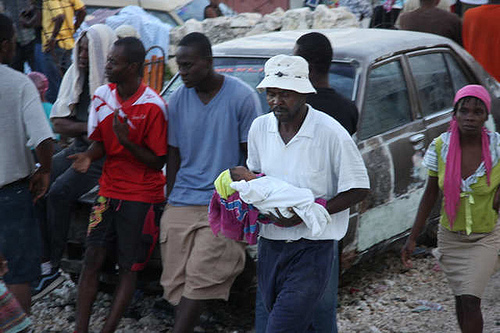The comparative method of the science of history helps to explain the poverty prevailing in Haiti

History is rarely considered a science, but it can be one with the help of the "comparative method". Jared Diamond, professor of geography at the University of California at Los Angeles (UCLA) and James A. Robinson, professor of government at Harvard University use this method effectively in the new book they edited together: "Natural Experiments in History" (Harvard University Press, 2010)*. In a well-timed study, Diamond compares Haiti and the Dominican Republic and demonstrates that although the two countries reside on the same island, the island of Hispaniola, geopolitical differences have resulted in one of them degenerating into poverty while the other prospers.
Bartholomew, brother of Christopher Columbus, founded a Spanish colony in Hispaniola in 1496 and established its capital in Santo Domingo in the east of the island. Two hundred years later, due to tensions between France and Spain, the Treaty of Reiswick in 1697 granted France sovereignty over the western half of the island. France, which was richer than Spain at that time, and slavery served as an integral part of its economy, turned western Hispaniola into a center of slave trade and created a horrific disparity in the composition of the island's population: about 500,000 slaves in the west compared to only 15,000 to 30,000 in the east.
The pressure created by this gap in the population and the demand in France to import more and more wood from Haiti increased the influence of the geographical factors. The meteorological fronts reach Hispaniola from the east, dumping rain on the Dominican side of the island and naturally leaving Haiti drier and with less fertile land suitable for agricultural crops. Haiti's need for agricultural land and timber resulted in rapid deforestation of the forests, which were sparser to begin with on this side of the island. The results were disastrous: soil erosion, lack of wood for construction and coal, heavier alluvial deposits in the rivers and damage to the drainage basins that reduced the ability to use the rivers to generate electricity. These positive feedback loops resulted in environmental degradation and led Haiti to misery.
When the people of Haiti and the Dominican Republic gained independence in the 19th century, further differences emerged. The slave revolts in Haiti were violent and Napoleon's draconian intervention to restore order meant that the people of Haiti no longer trusted the Europeans and subsequently avoided trade and investments, imports and exports, and immigration to and from the country. The slaves in Haiti also developed their own Creole language, which no one in the world speaks but them, and this further increased Haiti's isolation and prevented cultural exchange and economic ties. All of these barriers combined prevented Haiti from gaining the factors that normally allow a country to accumulate capital, wealth and abundance and that would have brought prosperity after independence. In contrast, Dominican independence was hardly accompanied by violence: the country oscillated for decades between independence and Spanish control, until Spain decided in 1865 that it was no longer interested in the colony. Throughout this period, the Dominicans spoke Spanish, developed export products, traded with European countries, attracted European investors, as well as diverse immigrant populations of Germans, Italians, Lebanese and Austrians, who helped build a bustling economy.
And finally, even when both of these countries fell in the middle of the 20th century to corrupt dictators, Rafael Trujillo's rule in the Dominican Republic brought significant economic growth. Driven by his desire to amass personal wealth, Trujillo pursued policies that encouraged industrial exports and the recruitment of foreign scientists and foresters who helped preserve the forests for his own overpriced personal assets. In contrast, Haiti's dictator, François "Papa Doc" Dublier, did none of these things and only increased the isolation of the people of Haiti from the world.
Diamond admits that there are many other factors involved in the long history of this island, but he writes that the comparative method "is based on a comparison, preferably a quantitative comparison with the aid of statistical analysis, between different systems that are similar to each other in many aspects but differ from each other in the factors whose influence we wish to examine."
The heart of all science is based on separating and isolating a few important variables that explain most of the measured variation. Applying the comparative method to such historical natural experiments is no different from what sociologists and economists do when they compare natural experiments in society today. So the time has come for scientists to respect history as a science and for historians to test their historical hypotheses using the comparative method and other methods.
*Jared Diamond and James A. Robinson, Natural Experiments of History (Harvard University Press, 2010).
Michael Shermer is the publisher of Skeptic magazine (www.skeptic.com and the author of the book "The Mind of the Market".

2 תגובות
As Idan said, don't miss it! Jared is a golden god of genius.
It is like the three candles - in "Guns and Steel Germs" it is written about the past of humanity and in "Collapse" it is written about the present and future of humanity.
All that's left now is to play the role we've been given in the Jardian Ragnarok.
Other recommended books by Jared Diamond:
"Guns and Steel Germs" (Pulitzer Prize Winner)
"collapse"
don't miss!!